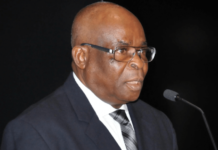The International Monetary Fund (IMF) says rise in oil
prices, continued growth in agriculture, and big government spending
will drive Nigeria’s economic growth to 0.8 percent in 2017.
prices, continued growth in agriculture, and big government spending
will drive Nigeria’s economic growth to 0.8 percent in 2017.

IMF Chief Economist, Maurice
Obstfeld who unveiled the fund’s World Economic
Outlook in Washington on Wednesday, said global growth will continue
with the help of advanced economies and emerging, low income countries.
Obstfeld who unveiled the fund’s World Economic
Outlook in Washington on Wednesday, said global growth will continue
with the help of advanced economies and emerging, low income countries.
“We
project the world economy to grow at a pace of 3.5 percent in 2017, up
from 3.1 percent last year, and 3.6 percent in 2018. Acceleration will
be broad based across advanced, emerging, and low income economies,
building on gains we have seen in both manufacturing and trade,”
Obstfeld said.
project the world economy to grow at a pace of 3.5 percent in 2017, up
from 3.1 percent last year, and 3.6 percent in 2018. Acceleration will
be broad based across advanced, emerging, and low income economies,
building on gains we have seen in both manufacturing and trade,”
Obstfeld said.
He added that commodity prices “have firmed since
early 2016, but at low levels, and many commodity exporters remain
challenged – notably in the Middle East, Africa, and Latin America”.
early 2016, but at low levels, and many commodity exporters remain
challenged – notably in the Middle East, Africa, and Latin America”.
“At
the same time, a combination of adverse weather conditions and civil
unrest threaten several low-income countries with mass starvation. In
Sub-Saharan Africa, income growth could fall slightly short of
population growth, but not by nearly as much as last year.”
the same time, a combination of adverse weather conditions and civil
unrest threaten several low-income countries with mass starvation. In
Sub-Saharan Africa, income growth could fall slightly short of
population growth, but not by nearly as much as last year.”
The outlook also explained how Nigeria will return to growth after an economic decline of 1.5 percent in 2016.
“In
sub-Saharan Africa, a modest recovery is foreseen in 2017. Growth is
projected to rise to 2.6 percent in 2017 and 3.5 percent in 2018,
largely driven by specific factors in the largest economies, which faced
challenging macroeconomic conditions in 2016,” the outlook read.
sub-Saharan Africa, a modest recovery is foreseen in 2017. Growth is
projected to rise to 2.6 percent in 2017 and 3.5 percent in 2018,
largely driven by specific factors in the largest economies, which faced
challenging macroeconomic conditions in 2016,” the outlook read.
“After
contracting by 1.5 percent in 2016 because of disruptions in the oil
sector coupled with foreign exchange, power, and fuel shortages, output
in Nigeria is projected to grow by 0.8 percent in 2017 as a result of a
recovery in oil production, continued growth in agriculture, and higher
public investment.”
contracting by 1.5 percent in 2016 because of disruptions in the oil
sector coupled with foreign exchange, power, and fuel shortages, output
in Nigeria is projected to grow by 0.8 percent in 2017 as a result of a
recovery in oil production, continued growth in agriculture, and higher
public investment.”
The IMF also said “inflation in 2017 is
expected to remain at double-digit levels in a few large economies in
sub-Saharan Africa (for example, Nigeria, Angola, Ghana), reflecting,
among other factors, the pass through of large depreciation”.
expected to remain at double-digit levels in a few large economies in
sub-Saharan Africa (for example, Nigeria, Angola, Ghana), reflecting,
among other factors, the pass through of large depreciation”.
Despite
Brexit shocks, the UK is projected to grow at two percent — the fastest
economic growth for the advanced economies in the European Union.
Brexit shocks, the UK is projected to grow at two percent — the fastest
economic growth for the advanced economies in the European Union.
The US economy is projected to grow at 2.3 percent in President Donald Trump’s first year in office.
The Cable











